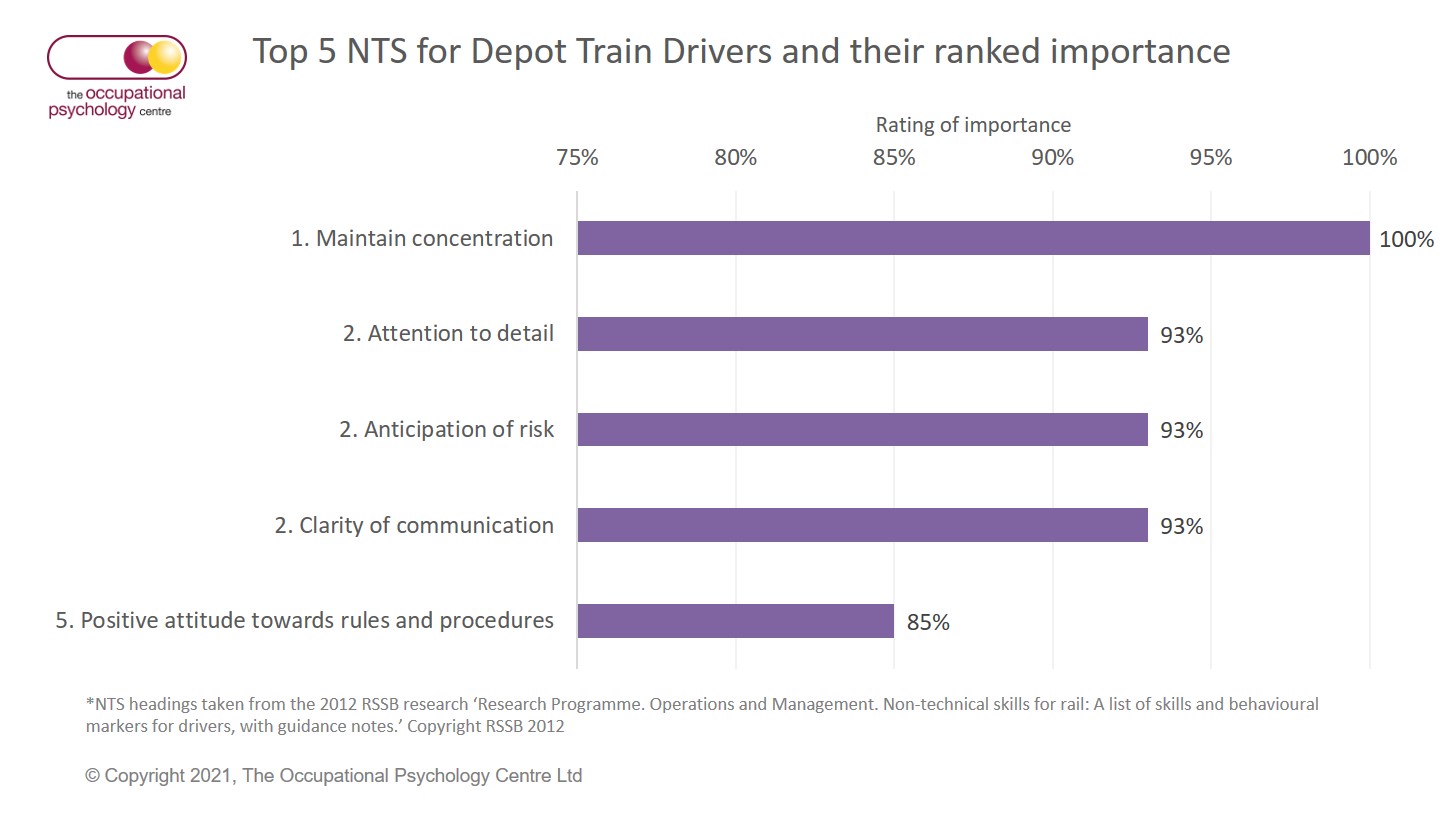NTS Story 6: What NTS are most important to depot drivers?
After a short break, Dr Stephen Fletcher, occupational psychologist and director at the OPC has written the 6th in the series of 8 articles about NTS. This article explores the NTS that are important to the role of a depot driver. Previous articles have looked at using safety incident investigations to help uncover NTS shortfalls that may have contributed to an incident as well as articles covering what are the most important NTS for the role of train dispatcher, train driver and train conductor.
The key role of depot drivers in managing the safety of depots
Depot drivers drive trains within a depot environment, often at low speed. It is important that our depot drivers have the right mix of NTS to undertake their jobs in a safe and effective manner. Some UK train companies will use the depot driver role as a promotional step for mainline driving. So, if an employee performs well in the depot driver role they may be considered for mainline driving. In contrast, some train operators allow a mainline driver to step into depot driving duties when the driver is considered no longer suitable for mainline driving e.g. the driver may have had a high number of safety of the line incidents. However, it is important to note that the depot environment can often be very busy with different safety critical employees undertaking numerous safety tasks. Just like the mainline, it can be dangerous and the consequences of errors or violations can still be enormous. So, if we need our depot drivers to be safe and effective, then what are the key NTS they need to demonstrate their day-to-day work?
The OPC work with job experts to identify the key NTS for depot drivers
OPC psychologists worked with a major UK train operator to help identify the NTS that are most important to its depot drivers. Job experts – safety managers and depot managers, with in-depth knowledge of the depot driver role were asked to rate the importance of 26 NTS to the role. OPC psychologists then analysed the data and ranked the NTS in order of importance. The results are shown in the graph below for the top 5 NTS:

A summary of the results – the top five NTS
These results are from one UK train operator and a small group of job experts, so they should be treated with a degree of caution. However, in support of these findings OPC psychologists have recently undertaken an in-depth NTS analysis of the depot driver role for another UK train operator. Analysis of this second set of results uncovered the same top NTS as listed above, so corroborating and supporting our initial findings.
- The results from our job experts indicated that the NTS of ‘maintain concentration’ was rated as most important for depot drivers – the same as a mainline driver. The depot driver needs to stay constantly focused whilst moving trains around in the depot, so the NTS of maintain concentration will be critical to safe performance.
The next three NTS were rated equally by job experts at 93% importance.
- The NTS of ‘attention to detail’ is rated as key to depot driving. Depot drivers need to make sure they attend to the detail of their task incorporating information they have been given about where to move trains from and to, adhering to depot speeds, and also working with signal and road numbers. The safe and effective working of our rail industry is dependent on all our safety critical employees, including depot staff, getting the detail right.
- ‘Anticipation of risk’ is another important NTS identified by our job experts as being equally crucial to depot drivers. There are many safety risks when working round a depot. Some of these are constant risks e.g. tripping hazards out on the ballast. Other risks are more dynamic and variable and will show themselves at different times e.g. a depot driver being shadowed by a new recruit who has limited experience of the depot and its safety hazards. We need our depot drivers to be constantly assessing and evaluating risk in a dynamic fashion, and then managing the emerging risks accordingly to help stay safe.
- ‘Clarity of communication’ is another key NTS for a depot driver. Within a depot environment effective safety critical communication is important. Depot employees will communicate extensively with each other. This could include giving each other instructions and advice about what to do, feeding back on what has taken place or gone wrong, or discussing and debating what the best course of action may be. So, we need our depot drivers to be effective communicators and to come to a clear understanding with their work colleagues. Failure to do so could leave a depot driver vulnerable to a safety incident.
- The 5th ranked NTS was ‘a positive attitude towards rules and regulations’ We work in a rule bound and heavily regulated environment with rules and procedures that have been built up over a number of years, often based on past incidents. Therefore, we need drivers to be rule focused and to enjoy working in a rule bound environment. They need to work effectively with both safety critical and non safety critical rules and importantly, when under pressure to break the rules the best driver will stick with the rules and not succumb. The NTS of ‘positive attitude to rules and regulations’ is especially important for depot drivers who may previously have been mainline drivers and who have been moved onto depot driving duties as a result of a safety incident linked to this NTS.
Helping to recruit safe and effective depot drivers
Some train operators will use the mainline driver selection process to recruit their depot drivers. This process can include a range of psychological tests and exercises. Other rail companies have tailored their depot driver selection process to assess for the key NTS required of a depot driver.
OPC Assessment has a wide array of assessment tools for safety critical roles, some of which are used by rail companies to help recruit safe and effective depot drivers. For example,
- the Safe Concentration and Attention Test (SCAAT) helps to assess the NTS of concentration;
- the Railway Verbal Communication Exercise (rVce) is used to assess verbal communication within a railway context;
- the Safe Personality Questionnaire (SAFEPQ) helps to assess an applicant’s propensity to demonstrate safe behaviours – such as cautiousness, resilience and rules focus; and,
- the Risk Anticipation & Time Focus Questionnaire (RTQ) helps to assess the anticipation of risk.
“Our depot drivers need to have the right NTS profile to undertake their roles safely and effectively. We have worked with depot drivers who have had NTS shortfalls whilst working in a depot environment. These shortfalls then contributed to serious safety of the line incidents. Demonstrating the key NTS of concentration, risk anticipation, rule following, attention to detail and clear communication can help protect a depot driver from safety incidents.
We can put the learning about these top 5 NTS for a depot driver to good use at selection by recruiting those candidates who have a greater propensity to demonstrate these NTS in the role. We can also raise awareness of these NTS amongst existing depot drivers too and show them the link between these NTS and their safety at work. We can also provide an NTS toolkit that has practical ideas and suggestions on how they can demonstrate more NTS behaviours at work, helping them to stay incident free”
Dr Stephen Fletcher, psychologist and director at the OPC
Want to know more?
If you would like to know more about this research or other work we are doing around NTS, then please contact us.
This article was published on Rail Business Daily (RBD) on 6th January 2021.
